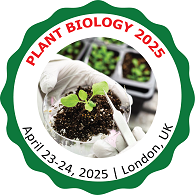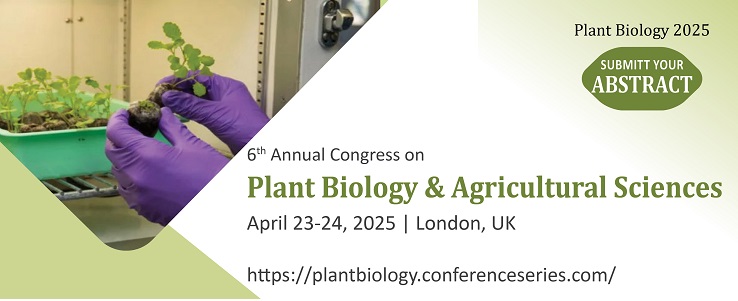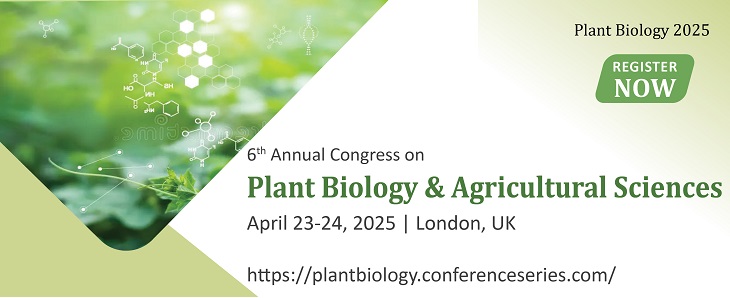Session and Tracks:
Track 1: Plant biotechnology and applications:-
The process of engineering plants to fulfill specific needs is known as plant biotechnology. In the conventional method, the main source for starting a new plant is the seed; however, the sophisticated method is self-sufficient and combines several requirements to produce the required features. Plant biotechnology addresses topics like tissue culture, genetic engineering, transgenic crops, genomics, and more. With the use of biotechnology, researchers can find and map genes, isolate and select particular genes from genetic resources, breed these genes, learn about their activities, and modify plants to meet particular requirements. The genetic transfer of particular features in order to merge with other genes to form a new species.
Track 2: Molecular biology of plants:-
Plant molecular biology is the study of plants' molecular foundations. It delves thoroughly into the ways in which structures, functions, and behaviors are exhibited by the information encoded in the genome. Strong advances in molecular biology have made it possible for plants and insects to withstand disease. It has been noted that breeding can be enhanced within the current genetic base with the application of molecular biological approaches.
Track 3: Plant pathology and disease management:-
The study of plant diseases and how to make plants more resilient to harmful environmental factors and parasite microorganisms is known as plant pathology. The study of biotic and abiotic variables that prevent plants from reaching their full genetic potential is known as plant pathology. The aim of this field is to create solutions that will safeguard plants, lower crop losses, and improve food security. A biotic illness is caused by virulent pathogens infecting vulnerable plants in an ideal environment. Abiotic diseases are those that are brought on by chemical or physical non-living substances.
Track 4: Plant Sciences and Plant Research:-
Plant science, often known as botany, is the study of organisms belonging to the kingdom Plantae, or plants. Botany is derived from the term botanical, which is derived from the ancient Greek term botane, which meant "plants, grasses, and pastures."
Track 5: Plant breeding:-
The process of creating new plant types using scientific means is called plant breeding, which is also known as cultivar development, crop improvement, and seed improvement. The technique of breeding involves producing genetically varied populations over several generations, then using human selection to hone adaptive plant features into new combinations to create plants that are highly attractive. The selection procedure is directed by biological assessment in pertinent target habitats in conjunction with genome and gene knowledge. The measure of progress is gain under selection, which depends on genetic variety, degree of selection, and time. Hybrids and novel plant types have been produced by plant breeders worldwide.
Track 6: Developmental biology of plants:-
The study of plant development focuses on the process by which a single zygotic cell gives rise to a complex multicellular plant. "Plant evolution" encompasses many of the plant's responses to its surroundings as well as the development of a complete embryo from a zygote, seed germination, mature vegetative plant formation from an embryo, and the production of flowers, fruits, and seeds. Plant development includes the division and growth of a plant's cells, tissues, and organs. The growth and development of plants is an ongoing process. Throughout its life, new organs are developed and a plant mostly grows and develops post-embryonically. It covers the processes that underlie organogenesis, cell specification, differentiation, and meristem activity in flowering plants.
Track 7: Plant hormones and their functions:-
In order to develop and thrive, plants require sunlight, water, oxygen, and minerals. These are outside variables. A number of internal elements also influence the growth and development of plants. An example of a hormone produced by plants is called a phytohormone, or plant hormone. Very small amounts of these compounds can be found in plants. They originate from gases (ethylene), carotenoids (abscisic acid), adenine (cytokinins), indole (auxins), and terpenes (gibberellins). They might work together or independently. The functions of several hormones might be hostile or complimentary. The processes of vernalization, phototropism, seed germination, and dormancy are all significantly influenced by hormones in conjunction with environmental stimuli.
Track 8: Plant -Biotic interactions:-
Many different microorganisms, both subterranean and aboveground, dwell in dense populations within plants. The four types of bacteria that colonize plants are called endophytes, which live inside plant tissues, phyllospheric, which live on the surface of leaves, rhizospheric, which live in the soil near the roots, and epiphytes, which dwell on the surface of leaves. Numerous microorganisms can be found living in the rhizosphere, which is a crucial niche in plants. Among their qualities are those of encouraging plant development, preventing illness, getting rid of harmful substances, and absorbing nutrients.
The study of plant-animal interactions in the context of nutrient flow in food chains and food webs, the exchange of important gases such as oxygen and carbon dioxide between plants and animals, and strategies for mutual survival between plant and animal species through pollination and seed dispersal. Everything is part of ecology.
Track 9: Abiotic stress of plants:-
Abiotic stress can affect plants because they are complex organisms. Abiotic stress is the negative influence that inanimate objects have on living things within a certain setting. Low plant development and decreased crop yields globally are mostly caused by drought, salt, hot or low temperatures, and other environmental extremes. Abiotic stress poses a serious risk to food security as a result of climate change and environmental damage brought on by human activity. When plants are subjected to abiotic stress, they respond to the circumstances by going through a number of molecular, cellular, and physiological changes. Stress tolerance in both conventional and contemporary breeding applications can be enhanced by breeders with a deeper comprehension of how plants react to abiotic stress.
Track 10: Agronomy and agricultural research:-
The study and art of cultivating and gathering plants for recreational purposes, food, fuel, fiber, and soil restoration is known as agronomy. Included in the field of agronomy are plant physiology, meteorology, pedology, and genetics. Ecology, geology, biology, chemistry, economics, and genetics are just a few of the disciplines that are applied in it. In the discipline of agronomy, professionals are known as agronomists.
Track 11: Agricultural systems and management:-
Those who study Agricultural Systems Management (ASM) are better equipped to plan and run environmentally conscious businesses. The curriculum places a strong emphasis on creating associate degree business or business project criteria that require results responsibility. Understanding the corresponding level of instrumentality and unit area of buildings utilized with plants, animals, and their products is the foundation of ASM. To produce and sustain high-quality products, these processes necessitate corresponding understanding in the life sciences.
Track 12: Agricultural water management:-
The scope covers a wide range of topics, including groundwater and surface water's role in nutrient athletics, water balance issues, water resource use and conservation, flood management, erosion and desert runoff, water quality and pollution from agricultural water and agricultural waters, the effects of land use on water resources, water for recreation in rural areas, and agricultural and legal aspects of water use. Essential interactions between soil, water, and plants are only taken into account when they are pertinent to the management of agricultural water.
Track 13: Agricultural land:-
In agricultural soils, if the climate, soil sorting and crop management of the unit area are favorable for a significant population of soil fauna, high activity of soil fauna will cause the formation of a strongly biogenic soil structure dominated by excreta and canals.
Track 14: Plant genetics and genomics:-
Plant genetics is the study of heredity in plants, specifically the mechanisms of hereditary transmission and variation in heritable traits. Plant genetics differs from animal genetics in several ways: somatic mutations can contribute to the germline more easily because flowers appear at the end of branches based on somatic cells; polyploidy is more common; and plants also have chloroplast DNA.
Genome size, gene content, extent of repetitive sequences, and polyploidy/duplication events are the best ways to define plant genomes. It seeks to sequence, characterize and investigate the genetic composition, structures, organization, functions and interactions/networks of the complete plant genome. Plants also have mitochondrial and chloroplast genomes, but their nuclear genome is the largest and most complex. Plant genomics is critical to food security, human health and environmental sustainability
Track 15: Ecology and taxonomy of plants:-
Plant ecology is the study of the interactions between plants and their physical and biotic environment. Plants are photosynthetic and generally sessile organisms that rely on their local environment for sources of light, water, and nutrition. The primary goal of plant ecology is to provide sustenance for almost all humans and all terrestrial species.
A plant's size and standing in the community impact resource income and use, so plants have developed specialized adaptations to improve these abilities. Plants in the understory have evolved strategies to cope with low light conditions, while plants in the wild have evolved mechanisms to cope with excessive light. Taxonomy is the branch of biology that studies, describes, names and categorizes all living organisms. Plant taxonomy is one of the oldest scientific fields with roots dating back thousands of years.
Track 16: Abiotic stress of plants:-
Abiotic stress refers to the negative impact of non-living factors like drought, salinity, and extreme temperatures on plants, disrupting their growth and reducing crop yields. With climate change and human activities intensifying environmental challenges, abiotic stress has become a significant threat to global food security. In response, plants activate molecular, cellular, and physiological mechanisms to adapt and survive. Understanding these responses is crucial for developing stress-tolerant crops, enhancing both traditional and modern breeding strategies to improve agricultural resilience.
Track 17: Agronomy and agricultural research:-
Agronomy is a multifaceted discipline that blends both the art and science of cultivating plants for essential purposes such as food, fiber, biofuel, and environmental stewardship. It dives deep into understanding the relationship between plants and their environments, including soil composition, weather patterns, and plant genetics. Agronomists, the professionals in this field, act as problem-solvers, applying their knowledge of biology, chemistry, and ecology to improve crop yields, enhance soil fertility, and develop sustainable farming practices. By integrating advanced technologies, agronomy addresses modern agricultural challenges, ensuring food security and environmental health for future generations.
Track 18: Agroecology:-
Agricultural research appears to be the oldest form of organized research in the world. Agricultural research is described as any research activity aimed at increasing crop production and quality through genetic improvement, improved plant protection, irrigation, storage systems, farm mechanization, effective marketing and better resource management.
Track 19: Gardening and floristry:-
Horticulture is the art and science of cultivating high-value plants for food, beauty, and recreation, enriching our lives daily. Floriculture, a branch of horticulture, focuses on growing and marketing flowers and ornamental plants, while horticulture broadly covers a variety of garden crops. Both fields contribute to sustainable living by providing nutritious food and visual enjoyment.
Track 20: Agricultural systems and management:-
Agricultural Systems Management (ASM) prepares people to prepare and manage businesses based on environmentally friendly technologies. The emphasis of the program is on designing associate degree business or business project guidelines with accountability for results. ASM is based on an understanding of the associated degree of instrumentality and unit area of buildings used with plants and animals and their products. These processes require associated knowledge of life sciences to provide and maintain high product quality.























